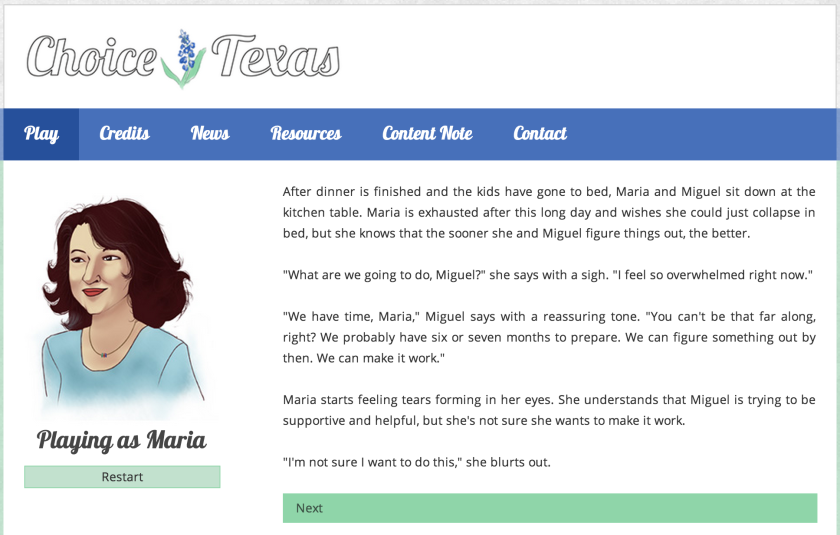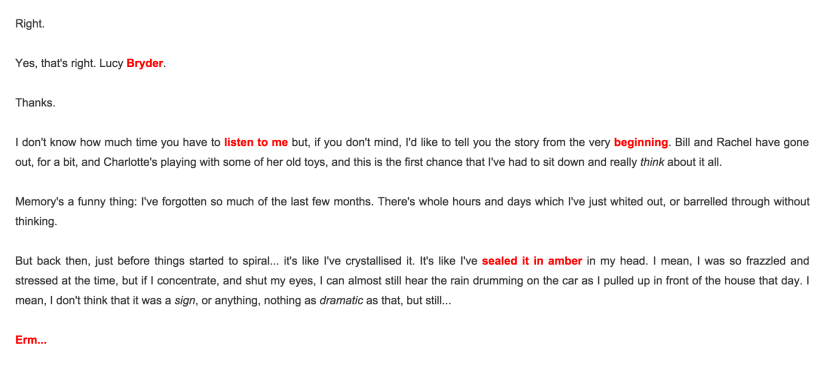Choice: Texas is a game about options for women in Texas who are facing unwanted or problematic pregnancies. It’s carefully researched and non-generic: there’s lots of information about costs, complications that apply to different situations, the rules for open and closed adoptions, the legal requirements that determine access to abortion, and quite a bit else.
There are five different protagonists, each with her own unique and branchy tale: a Hispanic mother who already has three children, a career-oriented black woman who faces a loss of opportunities at work if she stays pregnant, a teenager whose parents are anything but supportive, a victim of sexual assault, and a woman whose planned and longed-for pregnancy has turned up serious fetal abnormalities. Some of these characters have loving partners and good health care options. Some don’t, so much.
I was a bit apprehensive about playing: most of the stuff I encounter that touches on abortion gets really preachy in one direction or another, without capturing the emotional ambivalence and turmoil that often surrounds these decisions in the real world. Happily, “Choice: Texas” mostly avoids this. It portrays some religious people as shaming the protagonists, but includes others who are helpful and a useful spiritual resource. It indicates that adoptions are a possibility, but it doesn’t suggest that they always work out easily or go the way that the mother might have wished. It accepts that there’s emotional fallout for most of the kinds of choices these protagonists can make. With the possible exception of one “well THAT was handy” coincidence in Maria’s story, the range of outcomes all feel pretty solidly plausible.
As fiction, “Choice: Texas” sometimes works well — the story of Leah, the assault victim, contains some awful scenes in which she is unable to confront her attacker directly, and in general her experience is treated in a way that is quietly horrifying but not sensationalizing or leering. Several of the side characters are also well sketched. Sam, Leah’s take-charge sister, comes off as competent, a bit pushy, but ultimately also necessary to Leah. Eric, Alex’s irresponsible teenage boyfriend, is thoroughly punchable. Etc.
But sometimes the story is a bit too obviously about Example Women rather than fully-fleshed-out characters, or goes for a generic Tell rather than Show. I expected to feel more sympathy for Latrice, the career woman who struggles to balance a demanding work life with the prospect of a surprise child, but her career is sketched so abstractly that it was hard to sense her passion for it or feel that it would be a big personal loss of identity if she had to give it up. I can believe that it would be! But the story doesn’t really show how that’s the case. Likewise, the story hints at Maria’s Catholic background and possible reticence about abortion, but in such an abstract, hands-off way that made me feel the authors viewed faith more as a social phenomenon than as a wellspring of personal conscience. Again, this may be untrue in fact, but if it’s there, it didn’t come through to me via the story.
Meanwhile, I think the gameplay would have had to be something much more visceral in order to really capture the mother’s sense of connection with a wanted child. “Choice: Texas” is presented always in neat blocks of text, sometimes fairly long, broken up with Next buttons when necessary; it doesn’t attempt the denser interactive-poetry effects of a lot of modern Twine.
That’s probably fine, for the intended purpose of the piece: if it helps women understand their options, then that’s more important than delivering a really finely-drawn, unique protagonist each time around. And given the care that seems to have gone into explaining legal and medical issues in the story, as well as listing resources available in the state of Texas, I’m pretty sure that is the primary intent.
To the extent that “Choice: Texas” is propaganda, the propaganda consists in presenting a choice-based work to start with. Having been offered and accepting agency in these stories, the player is implicitly situated as believing that women should have that agency.
*
The Spare Set is a Twine piece written by Rob Sherman for Shelter, a UK charity that assists people who are having housing trouble, whether they’re actually homeless already or in a precarious situation that might lead to homelessness.
In almost every design respect, it’s the opposite of “Choice: Texas”. It’s consciously a story first. It tells the particular story of one particular family, down to the types of mugs they use and where they built the extension on their 1907 house. It’s told, moreover, in the format of horror: the narrator is vague about her exact current situation and keeps dodging around it and making allusions, keeping things uncertain, but foreshadowing inevitable outcomes.
There’s nothing you can do that will change the ending, and there isn’t supposed to be; at the end of the game it even drives this point home by making a list of what look like links, options to go back and change things you’d done earlier in the story, but none of them are actually active links at all. It’s too late to change anything, and changes would have made no difference.
Unlike “Choice: Texas”, “The Spare Set” isn’t for the person facing a housing crisis; it’s an appeal to potential donors, which ends with the opportunity to give to Shelter. From that perspective, it’s only obliquely important how any particular person or family wound up needing these services; by the time they reach Shelter, that need is already established.
“The Spare Set” doesn’t really attempt the kind of procedural rhetoric that persuasive games often go for. The game sort of lets you try to save the family from financial disaster — you can make choices like “sell the cars” or “hold a boot sale” — but it’s not a rigorous simulation, and because it isn’t (and the reader knows that it isn’t), it doesn’t really function like, say, Ayiti. It’s not trying to teach the player in general terms why poverty sucks and how unfairly it compounds. It’s not giving you a chance to totally map out a system in order to conclude that that system is rigged and unreasonable. It gives a few example anecdotes and moves on.
Instead, most of the story is about exploring the house the family used to have before they lost it to money crises: not a grand house, because they weren’t rich to start with, but one with many quirks that were loved and personal to them. An opportunity to explore what house-ness is and how much it matters to have one — not only for practical reasons, but as a locus of identity and memory and shared family space. The sacredness of the master bedroom is beautifully described. So is moment when the protagonist boils water in a pot to make tea for an estate agent because the kettle is already packed away. There is so much here — character histories, interactions, spaces and objects — much more than the story strictly requires in order to serve any message purpose. The house is overflowing.
Adam Smith’s Rock Paper Shotgun review suggests that the game runs a bit long. It did for me as well; or rather, the fact that I knew this was a game about housing problems and the heavy foreshadowing of the narrative made me anxious to move forward, to discover what was going to happen and to try to improve matters, and that made me a bit hasty in moving through the house. But for me that anxiety was productive. In Michael Lutz’s work I’m frequently stabbing links, willing the story to just TELL ME ALREADY what the horrible truth might be. Here I felt like I already knew the horrible truth (“they lose the house, right? it has to be that they lose the house; considering the context, this wouldn’t make any sense otherwise!”) and yet I still needed to get to it and see the particulars and find out just how bad it was. And so I hurried through exploring a space that the narrator explicitly wants to linger over and savor, just as the narrator herself never realized how much the house mattered to her until it was gone.
So. Overall, I felt like this was a piece that required (though it also rewarded) a bit of patience and a bit of interaction literacy: I can’t really guess how it goes down with players who just wander through the site and who aren’t explicitly looking to play some IF.
But I was looking to play some IF, and I enjoy Rob’s writing and strong sense of place, and judged purely as a bit of interactive story, it’s much more specific and more tightly observed than “Choice: Texas”.
*
Rob Sherman is currently writer-in-residence at the British Library, and is holding a couple of upcoming events: an open studio this Saturday, Jan. 17, and an evening talk on Thursday Feb. 5. There is no charge for either event. The studio event is open from 11 AM to 5 PM, while the evening starts at 6 PM and requires a (free) ticket.


I’ve just now played through Choice: Texas (once, so far, as Alex), thanks to this post. It was an interesting experience. (Since it might be relevant to how I responded to the game/story, I’ll disclose that I am not biologically capable of becoming pregnant, and that I believe that people have a fundamental right to sovereignty over their own bodies, including the right to decide for themselves whether to continue or terminate a pregnancy.)
Despite knowing that it was coming, I was genuinely somewhat startled when I was confronted with the following set of options:
• Alexandra decides to have an abortion.
• Alexandra decides to pursue adoption.
• Alexandra decides to become a parent.
In fact, I think I was startled in two different but perhaps related ways. On one hand, I didn’t feel that I knew the character very well yet, and the narration was also referring to her in the third person, so that made me want to say, “I don’t know! That’s her choice, not mine, and I don’t know what she wants!” But then I made more of an effort to put myself in her place, and tried to think about the options from a first-person perspective, and I realized that Alexandra quite likely doesn’t know what she wants at this point, either. None of the options is an easy one, and the one option she absolutely does not have is the option of not choosing—the one I instinctively looked for as a reader looking at her situation from outside. So in this case, I think the piece actually managed to leverage my distance from the character into an empathic sense of the character’s own ambivalence, which is a pretty impressive feat of storytelling judo.
Hm! Yeah, that is interesting.
When we were beta-ing Blood & Laurels, one of the players said that in a couple of restricted-choice situations, he wanted more ways to equivocate and not commit to either path. I took that to mean that we’d successfully conveyed that there were scary possible outcomes either way, and didn’t change those nodes.